Program Management Phase for Business Continuity Management for Property Developers

 The Program Management phase represents the final step in property developers' BCM planning methodology.
The Program Management phase represents the final step in property developers' BCM planning methodology.
After creating BCM strategies, conducting risk analysis and review (RAR) and business impact analysis (BIA), and developing BC plans, the Program Management (PgM) phase ensures that these efforts are sustained, effective, and responsive to changes.
For property developers, where projects are often long-term and involve substantial capital and stakeholder commitments, this phase is essential for establishing an adaptive, resilient foundation capable of handling disruptions across project life cycles.
Property developers can foster a proactive approach to risk and resilience by embedding business continuity into the organisational culture. This can enhance project stability and stakeholder trust.
This phase also involves open communication with clients, contractors, and suppliers, keeping them informed and engaged in continuity planning.
Overall, the Program Management phase safeguards individual projects and strengthens the organisation’s reputation for reliability, preparing it to meet future challenges in an increasingly unpredictable environment.
Objectives of the Program Management Phase
 The Program Management (PgM) phase establishes a governance structure for the BCM program, emphasising accountability, performance tracking, and continuous improvement.
The Program Management (PgM) phase establishes a governance structure for the BCM program, emphasising accountability, performance tracking, and continuous improvement.
This phase helps property developers integrate business continuity into their day-to-day operations and supports ongoing resilience against potential disruptions.
Key Objectives
Key objectives of the Program Management phase include:
- Continuous Improvement. Regularly reviewing and updating BCM Plans to address changing risks, regulatory requirements, and business objectives.
- Program Governance. Defining clear organisational roles and responsibilities to oversee BCM activities, compliance, and performance.
- Resource Allocation. Ensuring adequate resources, such as funding, personnel, and technology, are available to sustain BCM activities and drive improvements.
Key Components of the Program Management Phase
1. Governance and Accountability Structure
- A strong governance structure is foundational to effective program management. Property developers should establish a BCM committee or designate a BCM officer responsible for coordinating BCM activities and aligning them with strategic business goals.
- This structure ensures that accountability and responsibility are clearly defined, from senior management to business unit coordinators, and that BCM objectives receive continuous support and oversight.
2. Continuous Monitoring and Updating
- Given the dynamic nature of property development, monitoring and updating BCM strategies and plans is critical.
- This involves regular reviews, risk assessments, and adjustments to address new threats, technological changes, and regulatory updates.
- Scheduled audits and reviews can reveal potential gaps or areas of improvement, ensuring that BCM remains practical and up-to-date.
3. Performance Measurement and Reporting
- Key performance indicators (KPIs) should be established to track the effectiveness of the BCM program. Metrics might include recovery time objectives (RTOs) and recovery point objectives (RPOs) for critical processes and compliance with BCM procedures during tests and drills.
- Regular reporting of these metrics to senior management and relevant stakeholders reinforces accountability and helps in decision-making related to program enhancements.
4. Training and Awareness Programs
- Property developers should implement ongoing training and awareness programs to ensure employees and stakeholders are well-informed about BCM Plans and their roles.
- Training sessions, workshops, and awareness campaigns promote a culture of resilience, ensuring that all staff members understand their responsibilities during a disruption.
- This strengthens the BCM program and enables faster, more coordinated responses during incidents.
5. Testing and Drills
- Regular testing and drills are critical to verifying the effectiveness of BCM strategies and preparing staff for real-life disruptions.
- Property developers should conduct scenario-based exercises that cover potential risks such as natural disasters, supply chain interruptions, and data breaches.
- These exercises help identify strengths and weaknesses in the continuity plans and provide valuable opportunities for improvement.
6. Stakeholder Engagement and Communication
- Communication with stakeholders, including clients, contractors, and suppliers, is crucial to supporting the BCM program.
- Regular updates on BCM progress, new strategies, and lessons learned from drills reinforce transparency and ensure stakeholders are informed and aligned with the continuity objectives.
- Open communication builds trust, reinforcing the developer’s commitment to resilience and reliability.
Implementing the Program Management Phase
To effectively implement the Program Management phase, property developers should develop a structured timeline and roadmap for reviewing and updating their BCM program.
This includes scheduling regular audits, conducting annual risk assessments, and setting training, awareness sessions, and drill dates. Allocating budget and resources specifically for BCM is also essential, ensuring the program can adapt and grow over time.
In addition, developers should document all changes and improvements made to the BCM program, creating a record of adjustments that can be referenced for future updates and decision-making.
Engaging external consultants or BCM experts can provide valuable insights and guidance, particularly if the organization faces complex or evolving risks.
Benefits of the Program Management Phase for Property Developers
The Program Management phase offers several advantages to property developers, including the ability to adapt quickly to changes, maintain regulatory compliance, and enhance project stability. With a proactive approach to business continuity, developers are better prepared to handle disruptions, from supply chain issues to environmental incidents.
Effective program management fosters a resilient organisation that delivers reliable results under challenging conditions, ultimately protecting the developer’s reputation, financial stability, and stakeholder relationships.
Moreover, a well-managed BCM program prioritises continuous improvement and positions property developers as risk management and resilience leaders, a quality that distinguishes them in a competitive market.
By embracing the Program Management phase, property developers can ensure that their continuity strategies are current and agile enough to meet future demands. This phase closes the BCM cycle with a commitment to ongoing resilience, creating a solid foundation for sustainable growth and success in the property development industry.
Summing Up …
The Program Management phase is the final step in the BCM planning methodology for property developers. It focuses on the long-term maintenance, improvement, and oversight of the BCM program.
This phase aims to ensure that BCM Plans are continuously aligned with the evolving needs of the property development industry. Key components of the Program Management phase include establishing a governance structure, conducting regular reviews and updates, and setting performance metrics to track BCM effectiveness.
 Other crucial elements are training and awareness programs, stakeholder communication, and consistent testing and drills, all of which are essential for sustaining a resilient business continuity program.
Other crucial elements are training and awareness programs, stakeholder communication, and consistent testing and drills, all of which are essential for sustaining a resilient business continuity program.
By effectively implementing the Program Management phase, property developers can maintain operational resilience and demonstrate a commitment to reliability.
Continuous improvement and engagement with all stakeholders enable the BCM program to remain relevant and responsive to industry shifts, regulatory requirements, and emerging risks.
This phase empowers property developers to handle disruptions swiftly, protect their reputation, and enhance their competitive advantage in a risk-sensitive industry.
Business Continuity Management for Property Developers |
||||
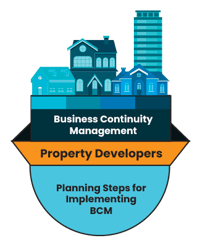 |
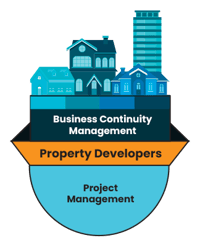 |
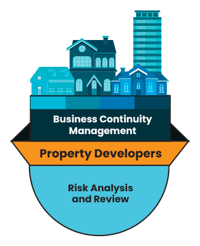 |
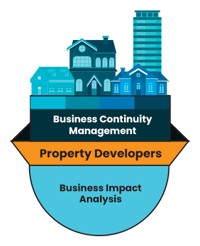 |
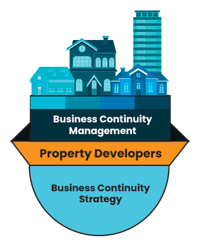 |
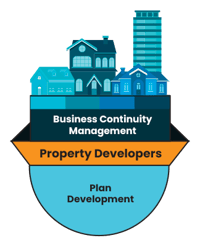 |
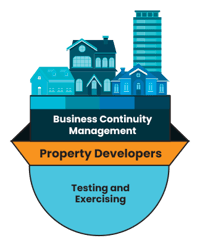 |
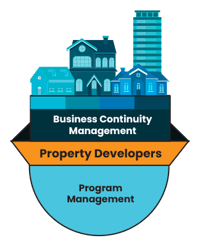 |
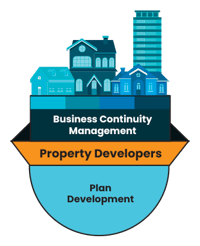 |
|
More Information About Business Continuity Management Courses

 To learn more about the course and schedule, click the buttons below for the BCM-300 Business Continuity Management Implementer [B-3] course and the BCM-5000 Business Continuity Management Expert Implementer [B-5].
To learn more about the course and schedule, click the buttons below for the BCM-300 Business Continuity Management Implementer [B-3] course and the BCM-5000 Business Continuity Management Expert Implementer [B-5].
![Register [BL-B-3]*](https://no-cache.hubspot.com/cta/default/3893111/ac6cf073-4cdd-4541-91ed-889f731d5076.png) |
 |
 |
 |
 |
 |
![FAQ [BL-B-3]](https://no-cache.hubspot.com/cta/default/3893111/b3824ba1-7aa1-4eb6-bef8-94f57121c5ae.png) |
If you have any questions, click to contact us.
|
 |
 |
 |
 |


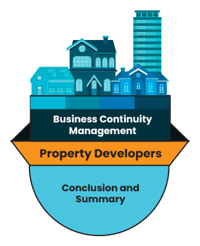
![Email to Sales Team [BCM Institute]](https://no-cache.hubspot.com/cta/default/3893111/3c53daeb-2836-4843-b0e0-645baee2ab9e.png)

